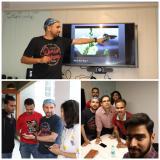Foundation course in Photography is the course designed for all who want to start their photography journey with the right set of knowledge about the basics, technicalities, and foundational fundamentals of Photography. This course is the foundation step for anyone who wants to pursue a specialized course in Photography in the future.
The course contains
Foundation Program in Digital Photography :
Duration 20 hours ( 10 days)
CLASS 1 : The Camera :
1) How does a camera work, Similarity to Human eyes.
2) Different types of Cameras in the market.
3) Importance of different components of a camera ( Lens, Sensor, Image processor)
4) Do Megapixels Count.
5) Introduction to different camera accessories : Flash, Strobe lights, Tripods, Filters,
Cleaning Kits, Lenses, batteries,
6) DSLR vs Mirrorless
6) How to decide your first camera / Next camera
CLASS 2 : Exposure : The Science
1) What is exposure ? Importance of Light.
2)Different components of Exposure : Aperture, Shutter Speed and ISO
3) Aperture :
• What is Aperture, How does it work.
• Practical purpose
• Depth of Field
• Artistic results achieved using Aperture.
• Practical Tips (Do’s and Don’ts)
4) Shutter speed:
• What is Shutter, How does it work.
• Different Types of shutter
• Shutter speed
• Practical purpose
• Motion Blur
• Artistic results achieved using Aperture.
• Practical Tips (Do’s and Don’ts)
5) ISO :
• What is ISO, How does it work
• Practical usage: When to use ISO settings.
• Limitations of ISO
6) Exposure Triangle: Introduction to manual mode.
CLASS 3: Using Manual Mode
1) Different modes in Professional Cameras
2) Why Manual Mode
3) How to click pictures in Manual Mode
4) Metering light and different metering Modes in advanced cameras.
CLASS 4: Rules of Compositions: The Art
1) How to old the camera or mobile phone for better results.
2) Different Rules of composition.
• Rule of third
• Symmetry
• Leading and diagonal lines
• Using natural frames
• Using geometrical shapes and patterns
3) Other tips for good compositions: Eye-level, Trying different angles, Awareness of
surroundings,
4) Common mistakes in compositions
5) Avoid clutter from the images
6) Visual Exercise: Find Bugs in Photographs
7) Process of reaching a good composition
CLASS 5 : Revision
CLASS 6 : Optics + Focussing
1) Different types of lenses and Practical usage
2) Basic lens anatomy
3) Depth of Field and what are the other ways than Aperture to control Depth of field
4) Hyperfocal distance.
5) Some of the common Lens defects
6) Different types of Camera filters and Usage
7) Introduction to Focusing : Auto and Manual
8) How do cameras focus
a. Contrast-detect Auto Focus
b. Phase detect Autofocus
c. Hybrid Autofocus
d. Dual pixel auto focussing
9) Different Focusing Modes in cameras :
AI Focus AF (Canon)/AF-A (Nikon)
One-Shot AF(Canon)/Single-Servo AF (Nikon)
AI Servo AF(Canon)/Continuous-Servo AF (Nikon)
10) How to focus on stars during night photography
11) Importance of Manual focus
CLASS 7: Introduction to Lighting
1) Introduction to Lighting.
2) Different properties/characteristics of lighting
a. Quantity of lighting
i. Controlling the quantity of light
b. Quality of lighting: Hard and Soft Light
i. What decides the hardness of light
ii. Modifying the light
iii. Different light modifiers
c. Color of light : White balancing
i. Introduction to White-balance
d. Direction of light
3) Shooting in Natural light
a. Perfect timing for photography
b. Importance of shooting on a cloudy day
4) Different Lighting setups using 1 light
5) 3 point lighting setups
6) Front Vs Rear Curtain Sync
7) High-Speed Sync (HSS) Focus
CLASS 8: Introduction to Editing :
1) Why editing? Is Editing Mandatory
2) Editing vs Manipulation
3) Different types of editing in different Photography Genres
4) RAW image processing
a. What is the RAW format?
b. Dynamic range
c. Advantages of RAW format.
d. RAW image editing in Adobe Camera RAW /Lightroom
5) Curve adjustment editing
6) Basics of Layers and Masking and other tools in Photoshop.
CLASS 9 . Introduction to concepts specific to Video (Video Resolution, Frame Rates,
Time-lapse, and Video accessories)
REVISION
CLASS 10. Revision, Q&A, and Photo review






